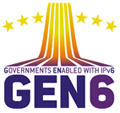
The project "GEN6 - Governments Enabled with IPv6” is founded by the European Commission, FP-7 framework. It addresses the issues faced by public administrations that need to upgrade existing e-government infrastructures to IPv6. The aim of the project is to share the knowledge gained from practical implementations in different scenarios of different project partners, when it comes to the transition to the IPv6 protocol.
The contribution of University of Luxembourg is split into two pilots, as follows:
- Cloud computing and IPv6 pilot
The University of Luxembourg, as part of this project, has successfully collaborated with another GEN6 partner (Citkomm) and a US-based company (Nephos6) to build a pilot experiment for an election infrastructure, featuring open-source cloud and IPv6 technologies. This experiment was successfully integrated in the May elections in North Rhine Westfalia, Germany. Our standpoint and our main interests in this project are:- to raise awareness that IPv6 clouds are the future
- to lead the way in how to deploy an IPv6-enabled private cloud
- to learn how to integrate private cloud to an existing production infrastructure
- to make first steps towards a resilient infrastructure during regional/national elections
- Cross-border IPv6 safety pilot
GEN6 has the vision that cross-border safety and cooperation can greatly benefit from IPv6. In the area of an emergency or large scale disaster at the border of several countries, deployed units need to communicate with their command-level and to collaborate in reliable and secure ways. Equipment and training is usually expensive and time consuming, as of now. On the other hand, operational effectiveness can be largely improved with the inclusion of sensors and databases. In this context, IPv6 provides a future-proof base for communication equipment integration into a common framework. Device integration on IP level can enable seamless operation over most wide area networks.
More information about the project can be found here.
Project duration: 01.01.2012 - 31.05.2015.
